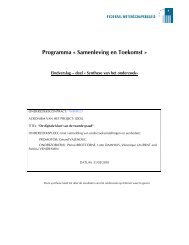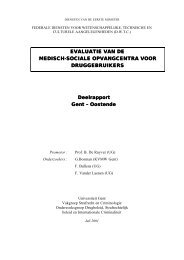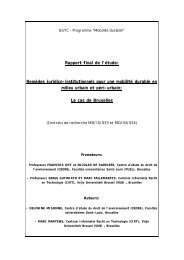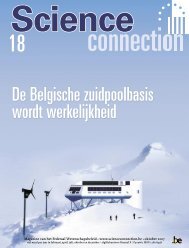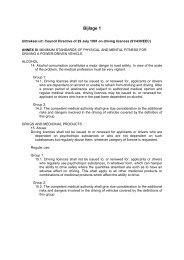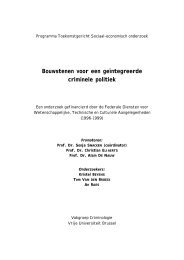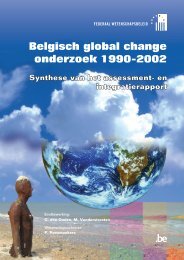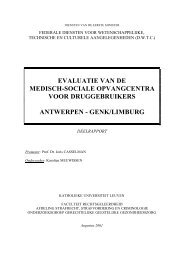chapter 3 inventory of local food systems
chapter 3 inventory of local food systems
chapter 3 inventory of local food systems
Create successful ePaper yourself
Turn your PDF publications into a flip-book with our unique Google optimized e-Paper software.
Project CP/59 - “Instruments and institutions to develop <strong>local</strong> <strong>food</strong> <strong>systems</strong>”<br />
We conclude that if one wants to support the social capital <strong>of</strong> farmers in general, it is<br />
more important to stimulate cooperation and exchange amongst farmers within any<br />
chain, rather than to focus on the LFS. In this light, the pioneering work <strong>of</strong> LFS towards<br />
the MFS can be compared to the pioneering role <strong>of</strong> organic agriculture towards<br />
conventional agriculture: asking for more appreciation for the farming sector as a whole<br />
through elaborated forms <strong>of</strong> communication and cooperation without the loss <strong>of</strong><br />
positive efficiency effects existing in the MFS.<br />
2.4.3. Social indicator III: Job satisfaction<br />
Job satisfaction in relation to different marketing <strong>systems</strong> involves mainly the<br />
appreciation one experiences with relation to the performed job. When this<br />
appreciation answers the needs <strong>of</strong> the involved person, this contributes to job<br />
satisfaction.<br />
Farmers and consumers tend to look for the lost or forgotten social aspects <strong>of</strong> both their<br />
beings. Farmers, as any other working people, look for appreciation in their work, where<br />
consumers trust in a direct relationship with the farmer to ensure the quality <strong>of</strong> their<br />
produce. As <strong>local</strong> <strong>food</strong> networks provide all involved parties with elaborated contact,<br />
can one conclude that farmers within LFS feel greater job satisfaction?<br />
The contact between producer and consumer in a LFS becomes a contact between<br />
producer and middle-man as consumer in the MFS. As already mentioned, participation<br />
in any supply chain is determined by personal attitude, background and abilities.<br />
Farmers participating in LFS have a strong preference for having direct contact with the<br />
consumer, which provides them the appreciation for their agricultural activities. Our<br />
interviews with MFS farmers show that these farmers look for a similar form <strong>of</strong><br />
appreciation. Either their contact with a small group <strong>of</strong> consumers feeds their<br />
motivation, or they depend on the appreciation from their customer, the middle-men.<br />
Whether this is ssatisfiable for them depends greatly on the personal attitude. Farmers<br />
who have the possibility and the empowerment to choose the chain where they feel<br />
most comfortable do confirm upon the appreciation they receive and the importance for<br />
their job satisfaction.<br />
Based on our research, we stipulate that it is not the nature <strong>of</strong> the supply chain that<br />
causes the amount <strong>of</strong> appreciation a farmer receives for his products, but the nature <strong>of</strong><br />
the farmer himself, who addresses those chains where he feels comfortable and<br />
appreciated. Within this scope it is desirable to support farmers in making their own<br />
choices according to their own expectations. At one side, this means choices should be<br />
open and reachable for as many farmers as possible. This requires not only a policy<br />
shift, supporting individual activities rather then monopolistic dominance, but also a<br />
shift in the present ideology concerning entrepeneurship (bigger is better). However, we<br />
do recognise that this evolution is determined by many different factors and is not to be<br />
expected at once. At the other hand, we wish to stress the importance <strong>of</strong> individual<br />
entrepeneurship, based on own ideas and expectations, supported in its singular<br />
character. In this scope it is important to stimulate farmers to ‘take their future into their<br />
own hands’, supporting any kind <strong>of</strong> innovation, specialisation, change or preservation as<br />
an answer to generalisation and globalisation.<br />
SPSD II - Part I - Sustainable production and consumption patterns - Agro-Food 39



